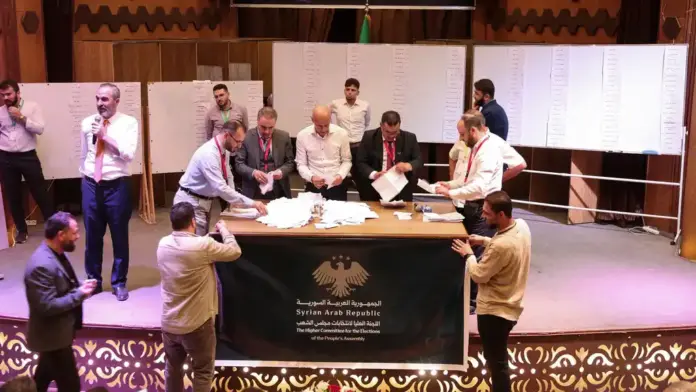Analysis – For the first time since the fall of Bashar al-Assad, Syria is holding legislative elections. But with a third of seats directly appointed by interim president Ahmad al-Chareh and entire regions excluded from the process, many question whether this marks genuine change or just a reshuffled authoritarianism.
A tightly managed vote in a fractured nation
On Sunday, Syria embarks on a symbolic milestone: its first parliamentary elections of the post-Assad era. The vote, however, is anything but conventional. Of the 210 seats to be filled, 70 will be handpicked by interim president Ahmad al-Chareh, who seized power in December 2024 at the helm of an Islamist coalition, ending over 13 years of civil war.
The remaining 140 members are to be selected through indirect elections by electoral committees formed by a commission—also appointed by al-Chareh. Critics argue this process lacks transparency and democratic legitimacy.
Meanwhile, two major areas of the country—Kurdish-controlled northeastern provinces and the Druze-dominated Suwayda—have been excluded from the process. Thirty-two seats will remain vacant, and women make up just 14% of the 1,578 candidates vying for positions.
“These are not elections, they’re appointments”
Among Syrians in Damascus, skepticism runs deep. “I support the government and want to protect the country,” says retired civil servant Louay al-Arfi. “But let’s be honest—these are not real elections.”
This sentiment is echoed by numerous civil society groups. Fourteen Syrian NGOs warned in September that the electoral process enables the interim president to “manufacture a loyal parliamentary majority,” undermining any hope of pluralism.
Bassam al-Ahmad, director of the Paris-based NGO Syrians for Truth and Justice, went further: “Call it what you want—this is not an election, it’s a selection.”
A constitution in limbo, and power tightly held
The newly elected Parliament will act in a caretaker capacity until a permanent constitution is ratified. Its two-and-a-half-year term is renewable, though nothing in the current political framework guarantees future direct elections.
In September, interim president al-Chareh claimed direct elections were not currently possible due to logistical issues, including the large number of Syrians abroad without valid documentation. Yet critics see this as a convenient excuse to delay full democratization.
Ethnic and regional exclusions deepen mistrust
The deliberate exclusion of Kurdish and Druze regions reinforces perceptions that the new regime intends to centralize power rather than share it. In the northeast, schoolteacher Nichan Ismaïl laments, “This could have been a new political beginning, but instead we’re seeing the same old marginalization.”
Negotiations with Kurdish authorities over a decentralized system have stalled. In Suwayda, the same frustration is echoed by activist Bourhan Azzam: “This process violates the basic rules of democracy.”
Even within government circles, the limits of the moment are recognized. Candidate Mayssa Halwani admitted that criticisms are “natural” in a country discovering political freedom. Yet candidates are screened to ensure they’re not Assad loyalists nor advocates of federalism.
Change in form, not substance
The October 5 vote may symbolize the end of Assad’s reign, but not necessarily the rise of genuine democracy. With a third of seats appointed, entire populations excluded, and opposition voices tightly monitored, the Syrian transition appears less like a rupture—and more like a rebranding of authoritarian continuity.



